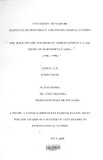| dc.description.abstract | Wars both intra and interstate have led to massive violations of human rights. The problem
of child soldiers has however not been emphasized, and more so the participation of girls as
soldiers in armed conflict. While authors writing on child soldiers have referred more to
boys than giris, the role of girls in conflict either as active combatants or in supportive roles
cannot be ignored. Most of these roles appear to perpetuate gender stereotyped roles
existing in societies during peacetime. such as cooking, child care and providing of sexual
favors to men and boys. While girls will join the armed group for various reasons such as
protection, avenge the death of family members, and as an economic incentive, majority
are abducted and forced to offer comfort to fighting soldiers either as 'wives' or sex slaves
as well as being put on the frontline as combatants and human shield. This exposes the girls
who are often abducted as young as seven years to psychological, physical and emotional
trauma as well as long term gynecological and medical complications including HIV and
AIDS resulting from rapes and other sexual and gender based violence. Integration of such
girls once released from the fighting forces or after escape is often difficult especially for
those returning with babies born in the bush. They are discriminated against and touted as 'rebel wives' and their children labeled 'enemy babies' and this lack of community support
forces them into prostitution as an economic survival for them and their children.
International legal instruments such as the optional protocol on Convention on the Rights
of the Child, and The African Charter on the Rights and the Welfare of the Child as well as
the Ugandan Children's Act does not specifically address the roles of girl soldiers in armed
conflict thus demobilization as well as integration efforts fail to address gender specific
experiences of the girl child soldier. | en |

